Recent News
One thousand turn up to help celebrate environmental landmarksThursday, June 09, 2022
About 1,000 people turned out to the Bermuda Aquarium, Museum and Zoo on Saturday to celebrate World Oceans Day and World Environment Day.
The facility, along with the Bermuda Zoological Society, hosted a free Family Open Day, where they demonstrated their “commitment to ocean conservation”.
David Wingate portrait donated to National Gallery
Thursday, May 12, 2022
A leading conservationist was presented with a portrait of himself in honour of his work.
Ornithologist shows David Wingate helping a fledging Cahow from its nest with two of the seabirds in flight behind him.
A dedication event was held at the Bermuda Aquarium, Museum and Zoo on Saturday.
SailGP preparations underway as Cross Island comes to life
Wednesday, May 11, 2022
Sailing fever is now in full swing at the West End ahead of the opening races of SailGP this weekend.
Behind the scenes at Cross Island, headquarters of the Bermuda Grand Prix, the sailing teams and their technical support are immersed in preparations.
BZS Welcomes Youth Climate Summit Participants to Trunk Island
Thursday, May 05, 2022
On Saturday, 30th April, the Bermuda Zoological Society (BZS) invited 6 participants from the Youth Climate Summit, as well as the Youth Climate Initiative Consulting Director - Dr. Rosemarie McMahon, for a morning of planting native trees on Trunk Island, the BZS Living Classroom. Under the careful guidance of Trevor Rawson, the BZS Trunk Island Project Coordinator, the participants were able to plant 30 native and endemic trees - teaching them the importance of placing trees and shrubs in a newly graded and exposed coastal environment.
Warwick Playground Transformed by the BZS Micro Forest Project
Tuesday, April 26, 2022
If you drove along South Shore in Warwick last Saturday morning you may have seen a large group of people planting at Warwick Playground. The Bermuda Zoological Society (BZS) was joined by their Junior Volunteers, members of the BZS Science Club, individuals from the Government of Bermuda’s Department of Parks, employees from the Bermuda Aquarium, Museum and Zoo and corporate volunteers from RenaissanceRe and Aspen Re to plant the second plot for the BZS Micro Forest Project.
About
GovernanceAbout Us
Newsletter
Latest News
Gift & Bookstore
Contact
General Inquiries
info@bzs.bm
Latest News
All the latest updates and news from the Bermuda Aquarium, Museum, and Zoo, one of Bermuda's leading visitor attractions!
For the fifth consecutive year, the Bermuda Zoological Society event REEF Watch trained teams of corporate professionals, teenagers and families to conduct coral reef surveys, fish counts and assessments of our reef ecosystem.
Scientists collecting dive slates
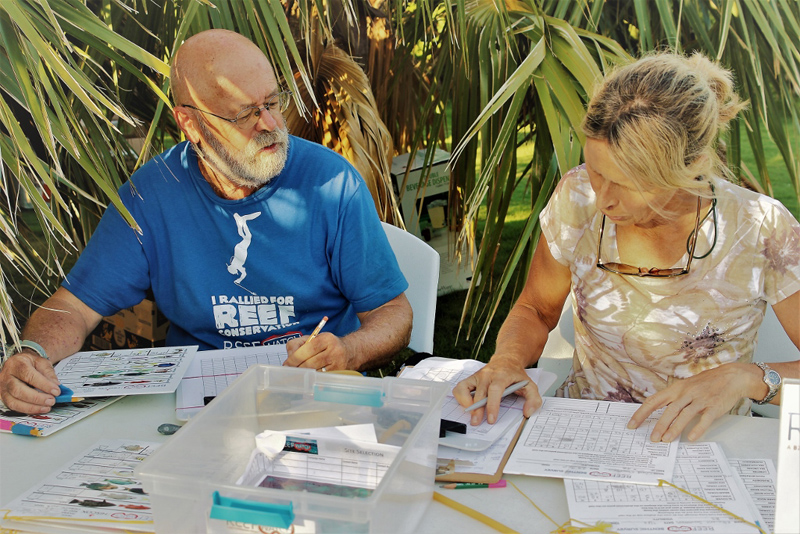
Nineteen teams set out on Saturday, 23 September to sample reefs across the northern platform. With ID sheets, dive slates and sand-filled hula hoops in tow they conducted health checks on the reefs and documented the abundance of inhabitants.
While visibility was compromised by the passing of hurricane Marie, the weather was otherwise favourable for boating and snorkelling and participants reported they really enjoyed the day.
Dr Robbie Smith providing an overview of results
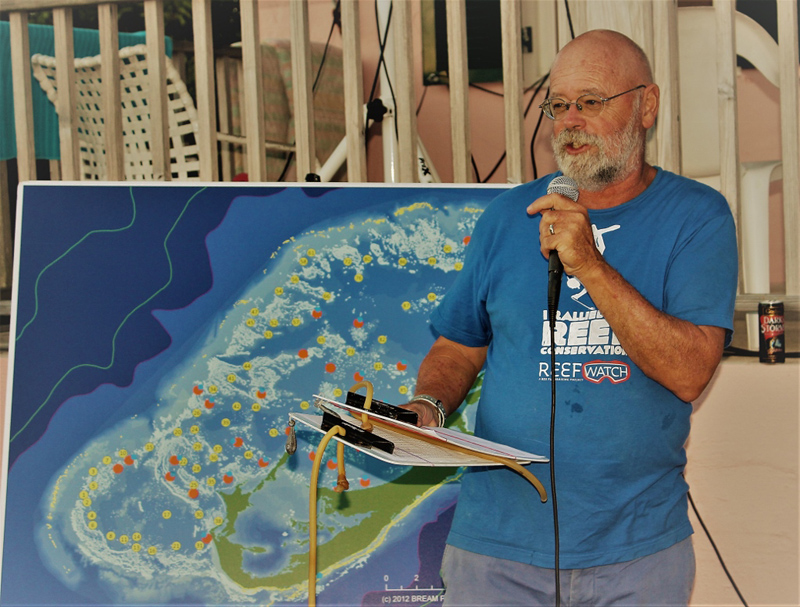
BZS said, “This year, REEF Watch teams surveyed 33 reefs – up from 23 in 2016 – and a preliminary assessment of the 2017 data reveals some interesting observations.
“We found predatory fishes, like groupers and snappers, on 75% of the reefs, lower than last year when these predators were observed on 85% of the reefs. The number of predatory fishes seen was low in both 2017 and 2016 [10 per reef] and only one reef in each year had what we would rank as a healthy population of predators.
Black Band Disease on a brain coral
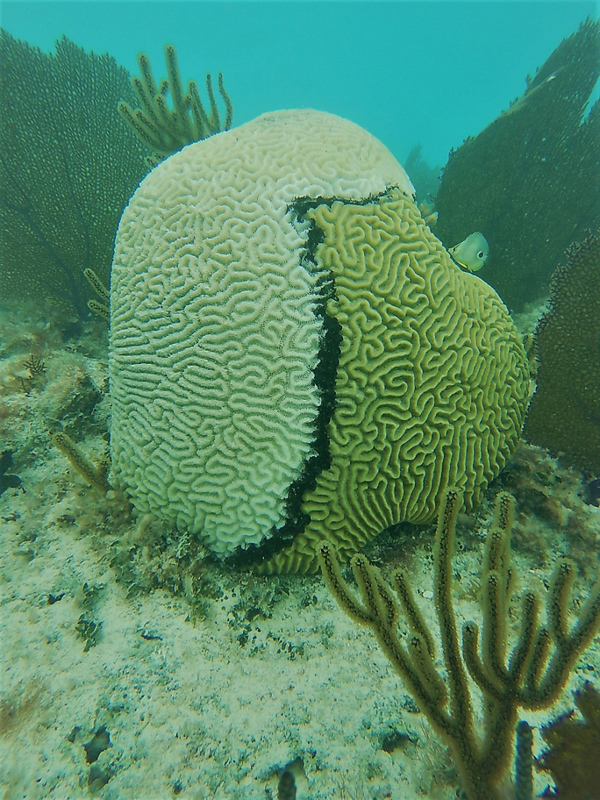
“35% of the reefs had healthy numbers parrotfishes and surgeonfishes in 2017, compared to 56% of the reefs in 2016.
“But unhealthy high densities of damselfishes, who can eat coral, were found on only 45% of the reefs in 2017, compared to 65% of the reefs in 2016. Once again no lionfish were seen at any of the reefs in 2017.
Winning Junior Team ‘Skylarkin’ – JP Didyk, Saxon Davis, Sebastian Lee, Cerra Simmons & BZS President Colin Brown
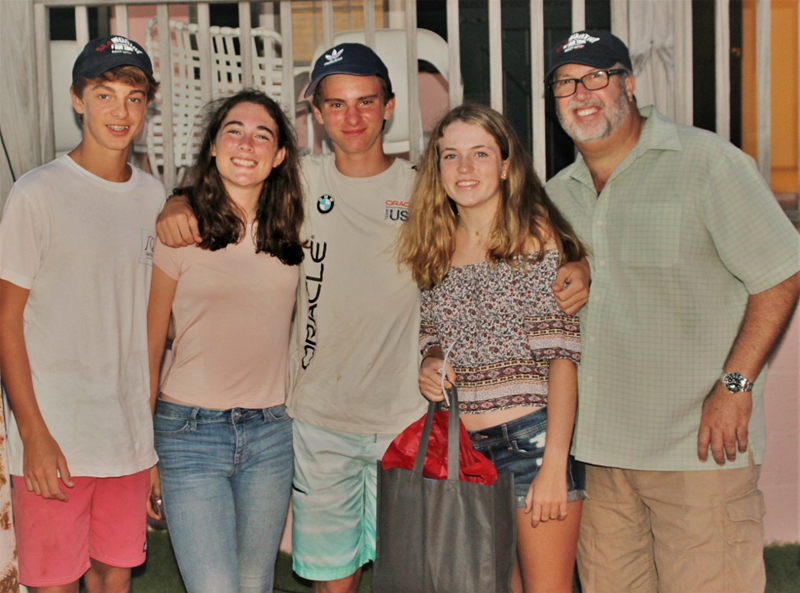
“Healthy populations of hard corals were found on 72% percent of the reefs in 2017 compared to 78% of the reefs in 2016. Diseased corals were observed on 38% of the reefs, higher than on 26% of the reefs in 2016. Bleached corals were recorded on 58% of the reefs in 2017 compared to only 44% of the reefs in 2016.
Trunk Island Mermaid Emily Andrew
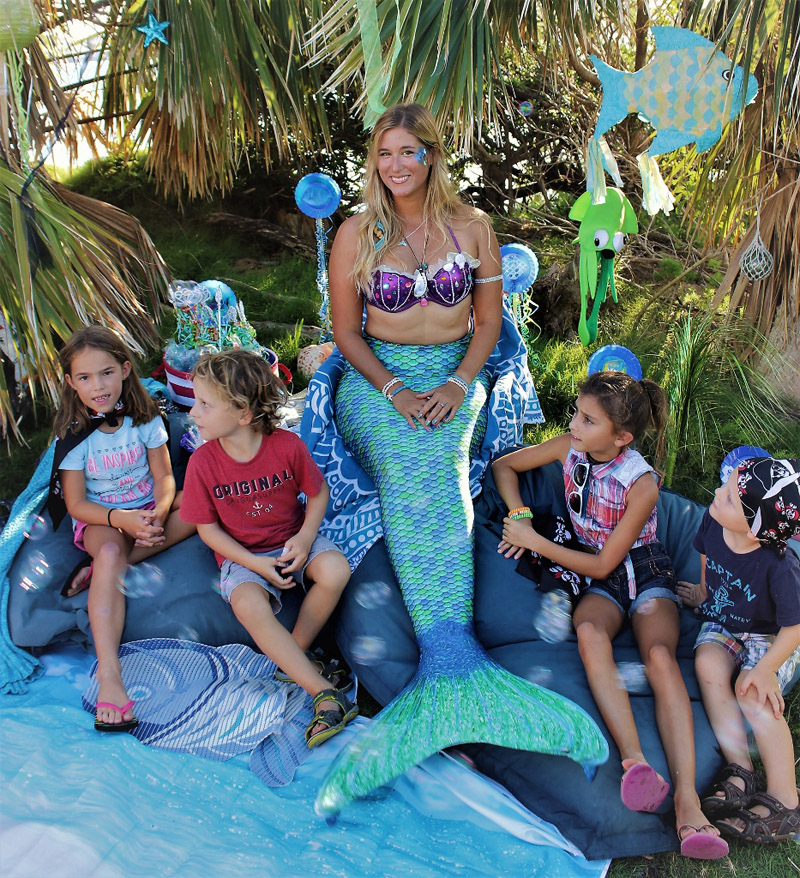
“Spiny lobsters were seen on 24% of the reefs in 2017, similar to 22% of the reefs in 2016. More detailed analyses will firm up some of these initial conclusions.”
REEF Watch 2017 concluded with a barbecue after party on Trunk Island – the BZS Living Classroom – where the work of the day was acknowledged, prizes awarded for efforts and a fabulous time had by all.
Children were entertained with a pirate treasure hunt in the woodlands and an encounter with a resident mermaid before toasting S’mores on the fire pit while the adults relaxed to steel pan music.
Hula fun at the Trunk Island BBQ
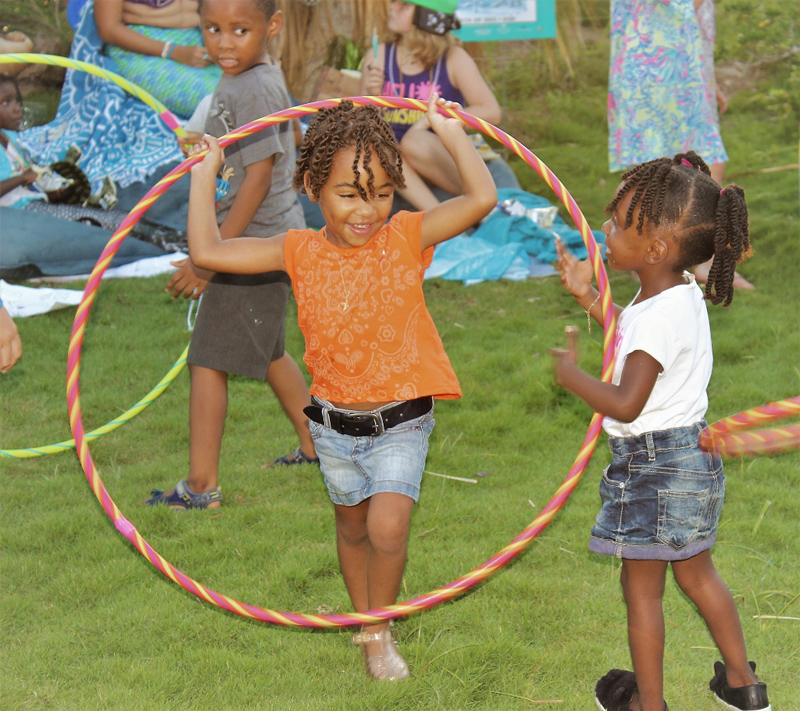
BZS added, “Not only did our citizen scientists give up their day to survey reefs they also raised funds to support ongoing reef conservation. Fundraising was very successful with more than $22,000 raised. Sponsorship of the event by Hiscox means that every dollar raised goes directly to funding coral reef research and conservation in Bermuda.”
Roasting marshmallows for S’mores at the Trunk Island BBQ
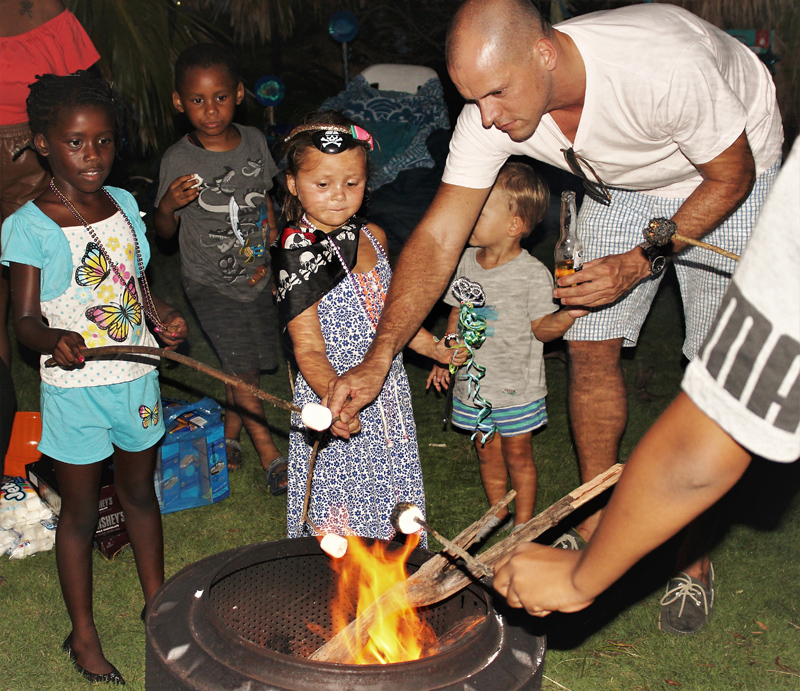
“With all the recent devastation caused by hurricanes in the Atlantic, we must be grateful for the robust reefs surrounding our small oceanic island and mindful of the security they provide us.
“It is imperative that we monitor their health and promote effective management when needed. The REEF Watch hope is that many more people get involved and appreciate the reefs incredible value to our very existence in this paradise we call home. Without them, we would wash away!”


